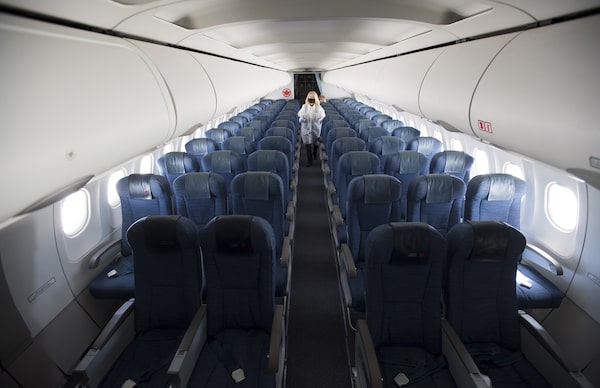
A flight attendant wearing personal protective equipment walks through the back part of a near empty plane from Calgary which landed in Vancouver, B.C., on June 9, 2020.JONATHAN HAYWARD/The Canadian Press
The labour union representing Canada’s flight attendants is calling on the federal government to require airlines to better protect employees and passengers against COVID-19.
The Canadian Union of Public Employees, which represents 15,000 cabin crew members at nine airlines, said Ottawa must create rules – not guidelines – that ensure airlines provide workers with N95 respirators and other protective gear, and give greater powers to refuse work they deem unsafe.
Hugh Pouliot, a CUPE spokesman, said that in the absence of government rules, the quality, supply and fit of face masks, gowns and other protective gear available to flight attendants varies by airline. He singled out Air Canada as a provider of better equipment for its on-board staff. “They are leading the pack but some of the smaller airlines are behind,” Mr. Pouliot said by phone.
Transport Canada says the aviation industry should look to the Public Health Agency (PHAC) for guidance on how to respond to the COVID-19 pandemic. Airlines should develop rules for physical distancing, hygiene and other measures that are consistent with PHAC guidelines, and ensure that these are in place to protect employees from the virus, Transport Canada says.
Because physical distancing is often not possible on a plane, airlines should use “layered” measures to protect employees, including having them wear “non-medical nose and mouth coverings,” the federal regulator says. The government requires passengers to wear face coverings in airports, and airlines require them to wear them on board.
Mr. Pouliot notes that these are guidelines, not rules. “There is concern here that everything the airlines are doing is voluntary and at any point they could decide, ‘okay, we’re not providing these now,’ or to downgrade the quality” of the protective gear,” he said.
The union’s website says: “If flying is unsafe for flight attendants, it’s unsafe for passengers, too.”
Peter Fitzpatrick, an Air Canada spokesman, said crews are given N95 masks, gowns, gloves, goggles and hand sanitizer. “We ensure a safe environment by providing our flight attendants with all the recommended PPE and have been doing so essentially since the pandemic began,” he said. “We ask [flight attendants] on duty to take their temperature twice daily and also offer COVID-19 testing. We have adjusted our onboard processes to minimize interactions between employees and customers for the safety of both groups.”
Transport Canada, WestJet Airlines, Flair Airlines and Air Transat did not immediately respond to questions on the issue.
Ottawa had announced that beginning on July 30, federal officials will be taking passengers’ temperatures to screen out those with symptoms related to COVID-19. The measure follows the arrival by plane of several people with confirmed cases of the virus.
Between July 16 and July 26, 32 international flights landing in Toronto, Montreal or Vancouver had at least one person on board infected with the illness, according to a federal government website. Another two flights, departing Toronto and Vancouver, carried cases of COVID-19 abroad.
“COVID arrived by airplane,” CUPE’s Mr. Pouliot said. “There are still flights landing at Pearson every day.”
The union is voicing its concerns as Canada’s airlines boost the number of flights or resume flying after a four-month suspension because of the pandemic. The airlines have highlighted their own measures intended to keep passengers safe from the virus, including aircraft disinfection, on-board air filters and preboarding screening.
The travel and tourism industry, led by Air Canada’s head Calin Rovinescu, is calling for the government to loosen travel restrictions intended to slow the spread of the virus. The measures include two-week quarantines for travellers, borders that are closed to most nonessential travel, and advisories against travelling for leisure. Some regions also have restrictions on visitors, including the Atlantic provinces.
Alexandre de Juniac, head of industry group International Air Transport Association, said this week that the patchwork of travel bans and quarantines is holding back the industry’s recovery, which will be delayed until 2024.
“Travel restrictions are the most immediate problem,” he told reporters. “Our challenge is to learn to live with this virus. But most of the world remains closed with severe restrictions on movement. Keeping travel and tourism, which is 10 per cent of the global economy, in lockdown does not qualify as progress towards learning to live with the virus.”
Some of the CUPE flight attendants are returning to the skies as airlines add summer routes, but fewer than 4,000 are working, Mr. Pouliot said. As more flight attendants are potentially being exposed to the virus, CUPE is launching a campaign intended to put pressure on Ottawa to toughen the rules on protective gear for airline employees.
Your time is valuable. Have the Top Business Headlines newsletter conveniently delivered to your inbox in the morning or evening. Sign up today.
 Eric Atkins
Eric Atkins